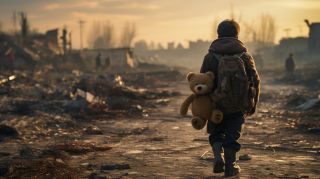Therapy
Special Needs Children in Ukraine Need Special Help
Virtual groups are providing needed support.
Posted February 20, 2024 Reviewed by Hara Estroff Marano
Key points
- The war in Ukraine wreaks havoc for special-needs kids.
- Virtual therapy offers a lifeline amid chaos.
- Parents under the prolonged stress of war also benefit from the virtual therapy.
In the wake of Russia’s invasion of Ukraine in 2022, the lives of millions were thrown into chaos. Among those most vulnerable to the disruption created by war are children with special needs. Their routines and support systems were shattered overnight.
Galina Itskovich, a clinical social worker and therapist in New York who was born and raised in Ukraine, has emerged as a beacon of hope for such children and their families. With a combination of empathy, innovation, and determination, Itskovich and her colleagues have been addressing the heightened challenges faced by neurodivergent children in a time of war.
War Changed Everything
Prior to the conflict, many such children had access to functioning support groups responding to their unique needs. However, the war's onset left many families to fend for themselves. The story of Marina, a 15-year-old with autism living in eastern Ukraine, exemplifies the difficulties faced by many.
Marina’s mother wanted to flee to a safer area. However, as she told Itskovich, “We have nowhere to go, and even if we had somewhere to go, we couldn’t afford to do it. At least here I have a job.”
Little Marina had been doing well before the invasion. She had school, friends and professionals who understood her needs. Now, this support system is gone: Most of the friends have moved away, the vocational program that she was enrolled in has closed, and pretty much every father is away fighting the war.
Marina was poised to lose all the gains she had made in coping with her autism. And with the entire support system vanished, Marina's mother was barely coping herself.
Virtual Support
Itskovich has been helping special-needs children remotely since 2014. She has visited Ukraine several times since the Russian annexation of Crimea and is plugged into Ukraine's special-needs community... When Marina’s mother reached out, Itskovich began leveraging her network and her information technology resources to help Marina and children like her.

Itskovich coordinated with the professionals in her network in Ukraine to set up virtual support groups, project “On The Move”. There are roughly five groups at any given time, and some of the groups have as many as 20 participants. Some groups meet twice a month, some weekly, and skilled therapists conduct the sessions.
In the virtual group-therapy sessions, Itskovich has to take into account that the mothers themselves may be dealing with tremendous stress. “I noticed,” Itskovich says, “that some people seem superorganized and capable, and then a short time later, they completely crash. I knew what was going on. The sympathetic nervous system had been in a state of flight-or-fight for too long and became exhausted.”
Itskovich makes sure to attend to the parents as well as children in the groups. Participating in one of the virtual groups is therapeutic for both parent and child.
Parents Participate
“What we are after,” says Itskovich, “is creating joint attention between the child and the parent. We want the pair to look at each other as they engage in the activity together and share the experience.”
Itskovich holds up a red ball, pretending she’s the child. “Look, Mommy, a ball!” Itskovich says, playing the role of the child. In a real session, ideally the child would look at the ball and then at the parent. The parent would then gaze back at the child. It would be a shared, interactive experience that both enjoy but seldom get to experience in the day-to-day world.
Now that such sessions are taking place in a war zone, they are subject to interruption by air-raid sirens. They no longer guarantee the quiet, stress-free environment suited to therapy, but it is the environment the therapists find themselves in and they deal with it.
The work of Itskovich and her team is a poignant reminder of the power of compassion and innovation in the face of adversity. While they may not be changing the outcome of the war, their efforts offer a lifeline to those caught in its shadows, sending a powerful message: "You are not alone."
This initiative not only provides immediate relief but also sets a precedent for how therapists and educators can extend their support across borders and crises, using technology to bridge the vast gaps created by war.




